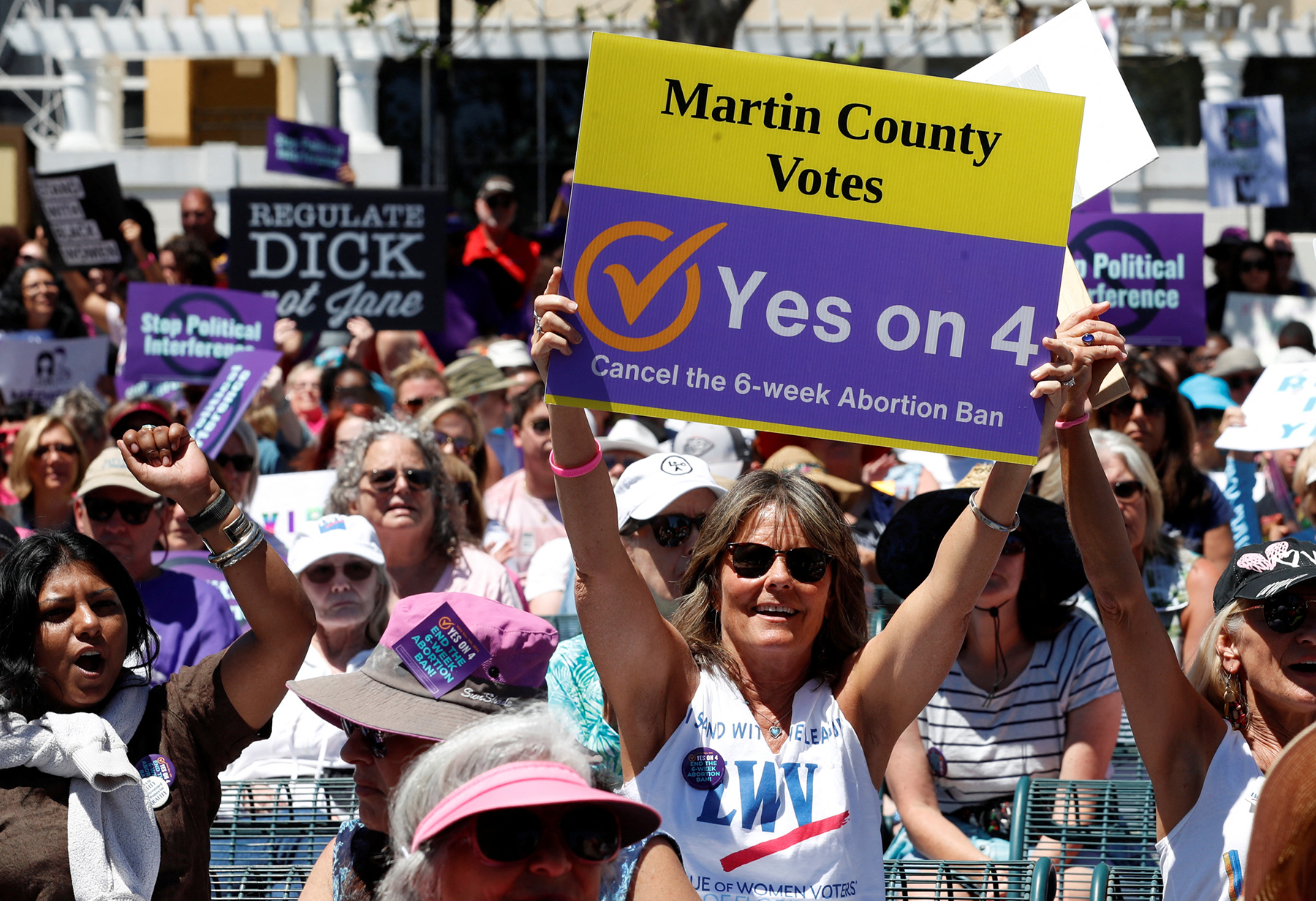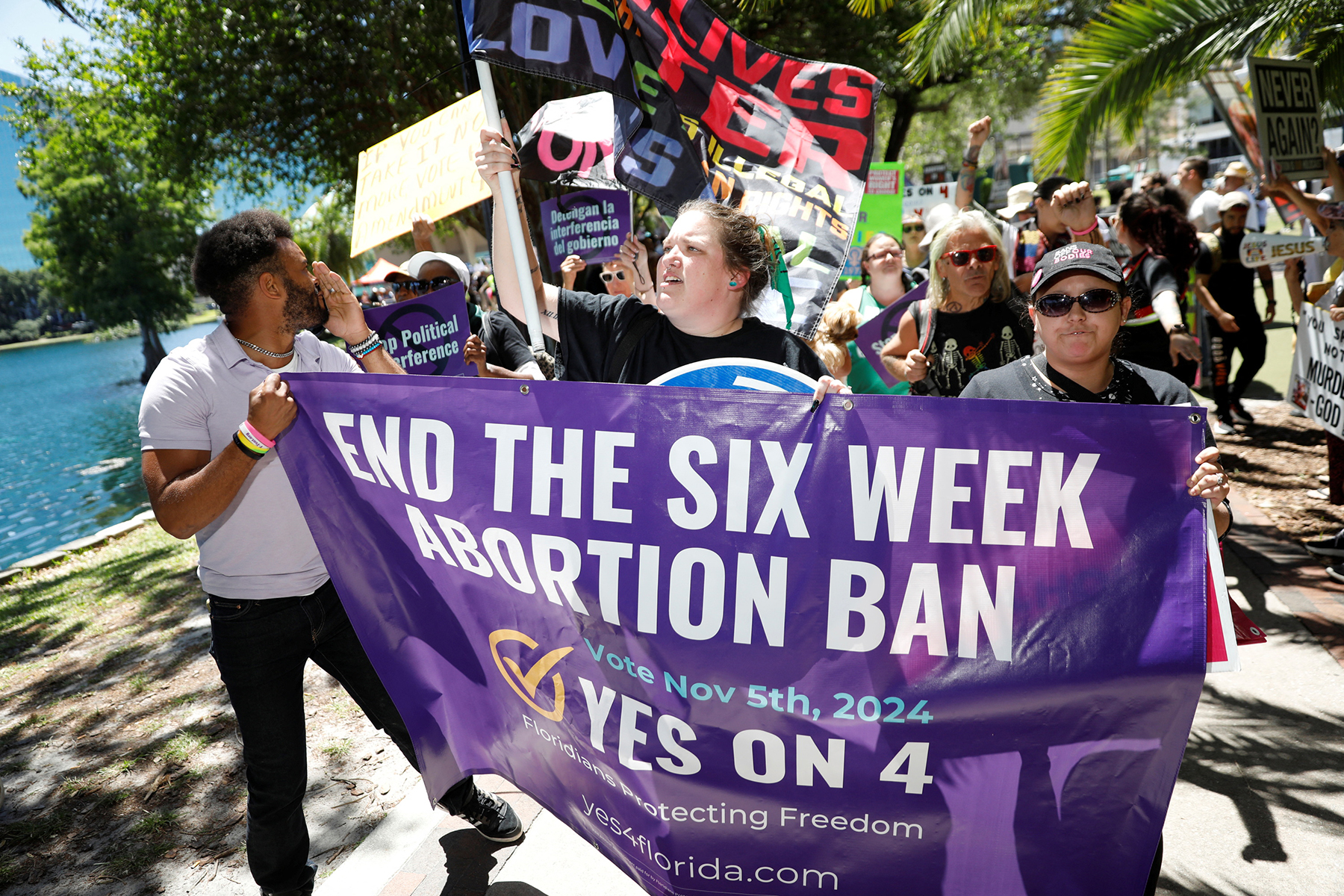During the 2024 election, 10 states had pro-abortion measures on their ballots. Seven of them passed. But in Florida, which currently has one of the nation’s strictest abortion bans, a citizen-led pro-abortion ballot initiative failed.
The ballot measure, Amendment 4, sought to allow abortions until viability at around 24 weeks of pregnancy, replacing the state’s current six-week abortion ban. Fifty-seven percent of people voted “yes,” but the measure required a 60% vote to pass.
The group that spearheaded the state’s pro-abortion measure, Floridians Protecting Freedom (FPF), clashed with state officials over alleged fraudulent petition signatures and a television ad in the weeks leading up to the Nov. 5 election.
The television ad, dubbed “Caroline” in court papers, features a Florida mother discussing a terminal brain cancer diagnosis she received when 20 weeks pregnant with her second child, before the state’s current restrictions went into effect.
“The doctors knew that if I did not end my pregnancy, I would lose my baby, I would lose my life, and my daughter would lose her mom,” she said in the ad. “Florida has now banned abortion even in cases like mine. Amendment 4 is going to protect women like me.”
The advertisement aired on nearly 50 television stations. But on Oct. 3, then-general counsel of the state’s health department, John Wilson, sent a letter to multiple media organizations, including WCJB-TV in Gainesville, requesting the stations stop airing the advertisement, claiming it was “categorically false,” “dangerous” and misleading about the restrictions on abortion in the state. Wilson resigned shortly after sending the letters.
As a result, the American Civil Liberties Union of Florida (ACLU-FL) filed a federal lawsuit in Tallahassee on Oct. 16, claiming that the state’s request to television stations to stop airing the advertisement infringed on both FPF’s and the broadcasters’ free speech rights.
“The State’s threatened sanctions against third-party media organizations that host the advertisement—in a heavy-handed effort to silence FPF’s speech—is a classic and deeply disturbing example of unconstitutional coercion,” the lawsuit argued.
Chief U.S. District Judge Mark Walker agreed on Oct. 17, ordering a temporary restraining order on any future attempts by the state to get the advertisements off air before the election.
“The government cannot excuse its indirect censorship of political speech simply by declaring the disfavored speech is ‘false,’” Judge Walker wrote. “To keep it simple for the State of Florida: it’s the First Amendment, stupid.”
In an interview with First Amendment Watch, ACLU attorney Michelle Morton described the First Amendment issues in the case. Morton argued that the state’s attempts constituted viewpoint discrimination and unconstitutional coercion, and championed Judge Walker’s decision that found the state’s actions violated the First Amendment.
Editor’s note: This interview has been edited and condensed for length and clarity.
FAW: What First Amendment issues arose as a result of the letters sent to media organizations?
MM: Really, what it boils down to, is whether the state can use its police powers to silence political speech, and specifically, criticism of laws. Our theories of the case are twofold. One, that the state engaged in unconstitutional coercion in trying to coerce the television stations to not air the campaign’s ad, and two, viewpoint discrimination because, of course, the whole point of them trying to take down this ad was because of the viewpoint shared in it.
FAW: Could this be considered a prior restraint because of the possible effect on television stations that had yet to air the advertisement?
MM: Yeah. I think, certainly, because not only were they threatening to punish the stations for having this ad on the air, but continuing to play this ad, and potentially other ads, would be exposing the stations to criminal penalties. So, yes, prior restraint would fit.
FAW: Hypothetically, even if the ad contained false assertions, wouldn’t it still be protected under First Amendment precedents?
MM: Absolutely. That’s what the judge ultimately found in issuing a temporary restraining order, even assuming that the ad was false, which, of course, is not our position. But even assuming that, the state can’t just suppress false information like that. The First Amendment applies even to false information, and certainly in the realm of political speech. The Supreme Court has been pretty consistent that we don’t ask our government to be the deciders of what’s true and false. That can get very dangerous. So the whole idea is to let these debates play out in the public, not be dictated by the government.
FAW: Is there prior history of a state or local government engaging in this kind of targeting of specific political speech airing on a broadcasting station?
MM: No. Really in the entire Amendment 4 campaign, there was so much that was unprecedented, and this was one of those that we didn’t find any similar examples of the state trying to stop political advertisements for an issue [or] campaign. And the way they did it, [using] the sanitary nuisance statute, which is used to control things like poorly maintained septic tanks, and we have no knowledge of that statute ever being used for speech.
FAW: Can you tell me a bit about this sanitary nuisance statute? How did Florida use it to defend against arguments that its actions violated the First Amendment?
MM: It gives some examples of the sorts of things that are sanitary nuisances, things that you would expect, diseased animals, things like that. Not ideas. The statute gives the Department of Health enforcement powers both to remove the nuisance itself, and then charge the party for that removal, and to pursue criminal penalties. The state argued that this is a law of general applicability, and as such, it doesn’t implicate the First Amendment. They relied on a line of cases dealing with the press, and how if a law of general applicability has a tangential effect or impact on the ability of the press to gather information, things like contracting law, the First Amendment is not implicated, the general law of applicability can still apply. And so the state tried to rely on that line of cases to say that this nuisance law was immune to First Amendment claims. The court rejected that wholesale. It’s an entirely different situation where the state is using this law, which may have been written to be a general law of applicability about sanitary nuisances, and is clearly using it directly to target speech it disagrees with. So this isn’t an issue of some tangential unintended effect of a general law.


